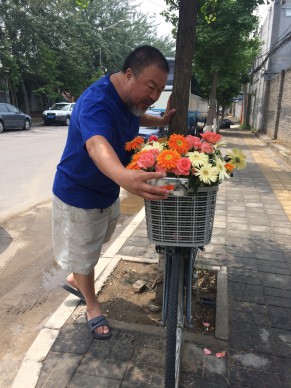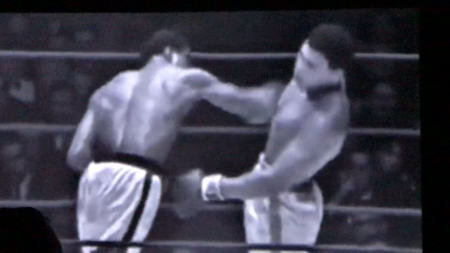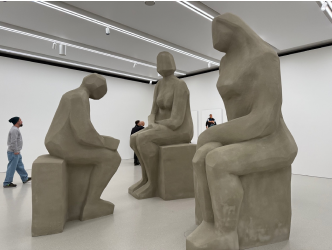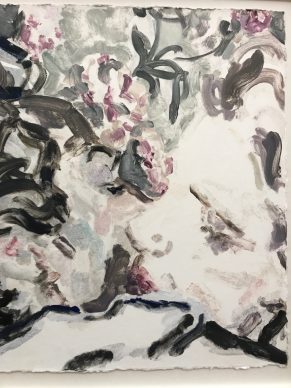And so the maestro makes his entrance. He’s wearing cargo shorts and plastic clogs. His face is that of a Chinese sage, like in ancient paintings. His overly round belly can no longer be concealed by his royal blue t-shirt.
We settle down on the other side of the courtyard. The place is huge. Assistants are busying themselves in a nearby room. Ai Weiwei is accustomed to hosting journalists. A lady who’s in charge of service brings over, without anything being asked, a glass of water for me and a cup of Long Jin tea for him.
I find Ai Weiwei as pop star less interesting than what moves him creatively. He’s already adopted a blasé interviewee attitude. He fiddles with his phone. Takes one picture of his cats, another of his cats, one of my sneakers, one of my rings. He reminds me of Warhol, who’d explain that he liked to turn the TV on when he was with someone so as to create a diversion—so that he could avoid being the recipient of that person’s full sensitivity or of his full boringness. Ai Weiwei is afraid of being bored. Yet he remains pleasant.
For a while now, the artist has been exploring ancient Chines culture quite thoroughly. He says that in September, at the Louvre exhibition organized by Jean de Loisy, he is planning to take the French curator to an ancient Chinese architectural structure. “It’s a human necessity to make use of the past,” he says. He explains that his visits to the spaces where his work will next be exhibited will be done through the Internet—his passport having been confiscated, he is kept from leaving Chinese soil. “Looking through a camera is very real. I am living in this reality. It’s a part of me. I can feel the computer’s coldness. It’s the inhuman part of today’s reality. With all this virtual space, I am protected. I don’t catch any diseases.” He laughs.
I ask him about the authorities’ ban on his traveling. “I can travel through China, but there’s always tourists taking pictures of me everywhere, and in the end you realize these aren’t tourists.”
I ask him about his desire to make outsizes work, such as in the two Beijing galleries where he is currently showing an ancient temple within two adjacent galleries (the structure is whole, but visitors’ sight is obscured by a wall), or as in a third space, where he’s used branches to create a fake giant tree without roots or leaves. “If you make small things, people forget you. I need to be noticed if I work. If you make noise, people should hear you.”
And what about copying, which he uses abundantly in his work: what are his thoughts on copying? “Copying is never about doing the same thing, given that the context is different. You have to respect copyright laws but there are different levels of copying. Art is transformation. Rembrandt was a copier. But not, in any case, as good a copier as a Phillips copy machine.”
Ai Weiwei is beginning to find the conversation interesting. He even lets go of his phone.
We talk about his father, a modern poet who was well known in China and passed away in 1996. “He lived very honestly. He never concealed his hatred or his love. He was a good man. Me, I’m not a good man. I like breaking rules. I must find a way to calm myself, to limit my thoughts. When the police questioned me, their conclusion was simple: he’s been watching too many Hollywood movies. Art is a language that’s parallel with the political. I’ve tried to escape the political.”
Later on, he relates his discovery of the U.S. when he was young, during his first trip to New York: “I thought I’d landed in a zoo. Personally, I wasn’t looking for success. I wanted to do something as an artist. At the time, China wasn’t attracting people’s attention yet. I didn’t want to paint. Especially given that it smells bad. Then I discovered Marcel Duchamp through Jasper John’s work. Marcel Duchamp was very French, very detached, and had a certain wisdom. The kind of artist I like. His entire work is about flirting. He’s light. He’s above things. He watches life in living color. I’m trying to have a light touch too.”
I point out that a work of his, a camera made out of marble, is anything but light. “There are 20 cameras around my house. Why does the State need to know so many things? And then you hear that the U.S. is spying on French leaders, and you realize that political leaders are after gossip. I am paying for what I’ve done because I deserve it. I had to cause problems. If you don’t think like this, you’re hurting yourself too much. You must accept the situation because this situation isn’t rational. My objective is to make the world more livable and to give hope. Success is synonymous with freedom. Success also means being loved by people. I like flirting with the world.”
Ai Weiwei is flirting with talent, and flirting far and wide. In September, his work will be the subject of a retrospective at London’s Royal Academy in September, part of a group show at the Louvre and the subject of a solo show in Helsinki. In November, it will be in Copenhagen; in December, in Melbourne; and finally in January in Paris once again, invited by Le Bon Marché department store.
Support independent news on art.
Your contribution : Make a monthly commitment to support JB Reports or a one off contribution as and when you feel like it. Choose the option that suits you best.
Need to cancel a recurring donation? Please go here.
The donation is considered to be a subscription for a fee set by the donor and for a duration also set by the donor.





